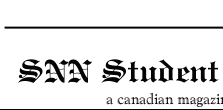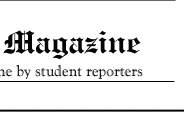 |
 |
|||||
 |
||||||
 |
||||
 |
||||
 |
||||
|
PROFILE
Career Profile: Journalist By: Erin Penney,SNN Editor, St. Mark's School, King's Cove, NF During the next few months I plan to write a series of articles on career options available to students. To start this series of career profiles, I decided to research the fascinating and challenging career of journalism. I interviewed Lynda Calvert, a national reporter with the CBC to further my understanding of the topic. First of all, I believe that SNN is a great place for any high school student interested in journalism to start. We, as students, are lucky to have such a program. Another important step students can make is to “read everything. Newspapers, books, watch documentaries, watch the news.” advises Calvert. Being an informed and interested citizen of the global community is definitely an excellent starting place. Liking people is also an important trait for every journalist to possess. It’s impossible to turn out a compelling story if you’re not genuinely interested in the people involved in the story and their opinions. Calvert says “you can have a PhD in journalism, but if you can’t talk to people at their level......whether it be a CEO of a high tech firm or a parent about daycare: you won’t get a good interview. And if you don’t get a good interview, you won’t get a good story.” Many students contemplating journalism careers wonder about university preparation. Several questions come to mind. Should I first pursue a Bachelor’s degree in liberal arts, then proceed to journalism school? Or should I go to journalism school right after high school? Which school should I choose? Sound familiar? When I asked Calvert about university preparation, she said “you won’t likely be hired without at least a Bachelor’s degree or a diploma, but it’s your personality traits that will prepare you and sustain you in the business.” She adds one word of caution; “don’t let anyone tell you you must have a journalism degree.” Calvert has a Bachelor’s degree in English Literature from the University of Toronto with a minor in Political Science from Universite Laval. If, however, you choose to pursue a degree in journalism, Canada has several universities with journalism departments. Some are the University of British Columbia, Ryerson University, Carleton University, and Concordia University. All these Universities are located in great cities for a journalist; Vancouver, Ottawa, Toronto and Montreal. (Below are links to the universities mentioned above.) You may be wondering if journalism is for you. Calvert recommends a journalism career “if you like long hours and an uncertain schedule. I love it. It’s a great feeling to see a story you have worked on come together in a compelling and insightful report.” When I asked her what happens on a typical day as a journalist, she answered that “you will meet a wide variety of people with a wide variety of stories and be expected to, in a short period of time (we’re talking 3 - 4 hours) turn around a coherent, interesting and insightful report.” Calvert also said that before you show up at work you need to read the major local and national papers in the morning and listen to both the radio and TV morning newscasts before you show up at work. “After you arrive, anything could happen. That’s the news business”, Calvert concluded. Here are some points I gathered through my research and interview with Calvert that you can put into action now to prepare for a career in journalism: -Keep a strong academic record in your high school courses so you can get in to your dream school. -Be an interested and informed citizen of your community, province, country and world. -Talk to a variety of people. Listen to their stories and opinions. This will help you develop that deep interest in humanity that I think is an integral part of being a successful journalist. Links to some Canadian universities offering degrees in journalism: University of British Columbia, Victoria, BC Carleton University, Ottawa, ON Ryerson University, Toronto, ON Concordia University, Montreal, Quebec |